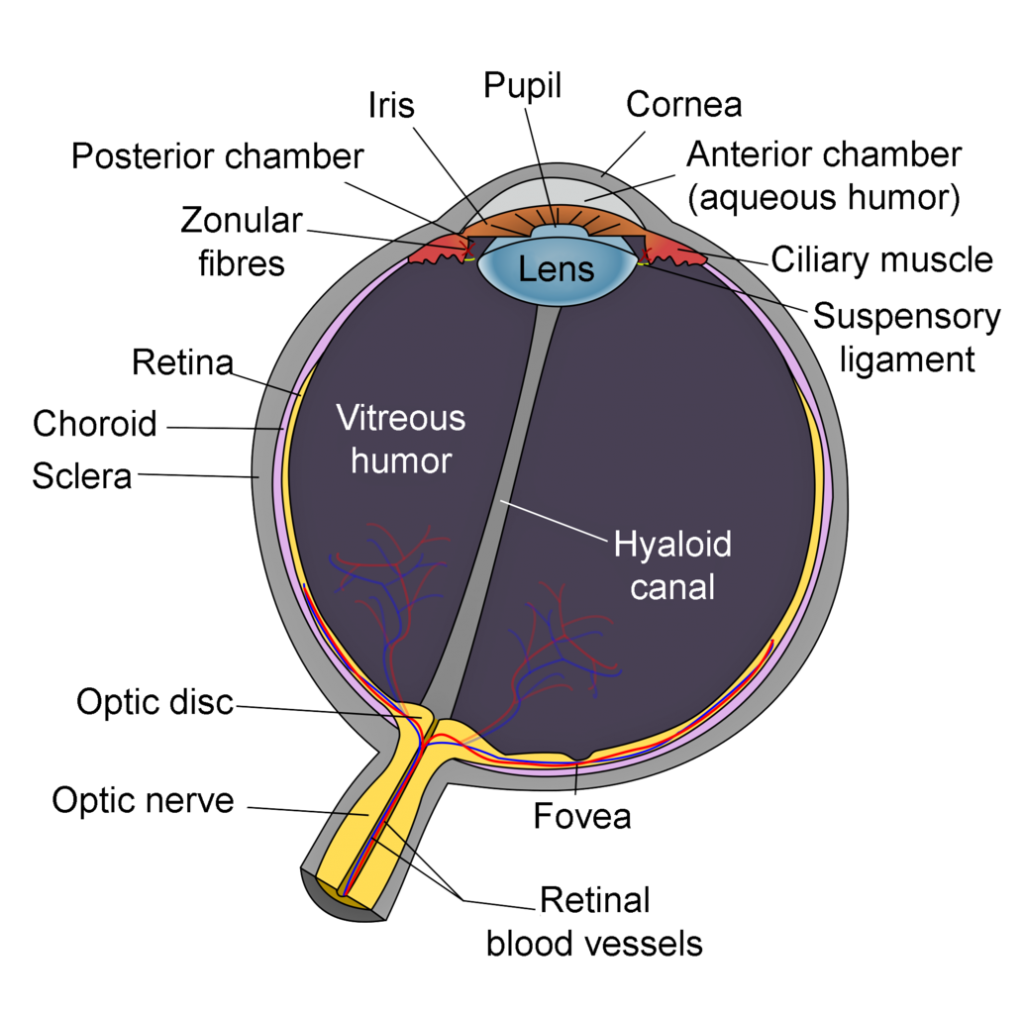Vitamin C may help protect the eyes from cataracts and slow down macular degeneration, but high doses should be avoided.

- Slowing AMD. Vitamin C in combination with other antioxidants, carotenoids, and zinc may help slow the progression of AMD.
- Protecting against cataracts. Higher dietary intake of vitamin C may lower the risk of cataracts.
Overview
Vitamin C, also known as ascorbic acid, is perhaps the most-widely consumed vitamin in the world. It is used to support immune system function, workout performance, and overall health. As an essential nutrient, vitamin C’s major role is to help produce the connective protein collagen, aid the function of white blood cells, and act as an antioxidant.
Vitamin C is also sometimes used to support healthy vision, particularly by warding off age-related macular degeneration (AMD) and cataracts – the two leading causes of vision deterioration and blindness. However, the research in this field has been inconclusive and conflicting. At best, it appears that vitamin C should be taken together with other vision-supporting compounds (such beta-carotene and zinc). In addition, getting your vitamin C from food may be superior to taking isolated vitamin C supplements.

How Vitamin C Might Help With Vision
Antioxidant activity
Vitamin C is present in the eye and particularly abundant (50 to 60 times higher than in the blood) in the lens – the convex structure that helps focus light and images onto the retina. Here, it acts as an antioxidant that helps fight the high levels of photo-oxidative stress that occurs in the eye as a result of its normal function. Oxidative damage to the lens is believed to play a particularly big role in the formation of a cataract – cloudiness of the lens that interferes with clear vision. This is supported by the fact that vitamin C content of the lens is associated with cataract severity, meaning that the worse the cataract, the less vitamin C is present in that eye’s lens. 1
However, it’s important to note that in high doses, vitamin C has also been shown to act as a pro-oxidant, meaning that it increases oxidative stress (and by extension, oxidative damage) rather than reducing it. 2 For example, long-term supplementation of high doses of vitamin C (~1 gram) was shown to increase cataract risk in several studies. 3

Vitamin C Uses & Benefits for Vision
Isolated vitamin C is rarely taken to support vision; however, it is frequently mixed together with other antioxidants, carotenoids, and minerals in multi-ingredient products. Research on the use of vitamin C for vision has been somewhat inconclusive; however, current findings indicate that:
- Supplementing with vitamin C has no effect on preventing age-related macular degeneration (AMD), but may help slow down its progression when taken as part of the AREDS formula (vitamin C 500 mg, vitamin E, beta-carotene, zinc, and copper)
- Supplementing with high doses (1+ g) of vitamin C alone may have no effect or even increase the risk of age-related cataracts
- Vitamin C intake of about 100 – 300 mg/day may decrease cataract risk; however, this intake is based on dietary sources, so it is unclear whether supplements would have the same effect
As such, it seems best to take vitamin C as part of a multi-ingredient formula, and/or increase your intake of vitamin C-rich foods.
Research
Human Research
A large number of studies have explored the link between vitamin C consumption and supplementation and age-related cataract and macular degeneration (AMD), indicating that it may be beneficial when taken in moderate doses.
This large double-blind, randomized clinical trial sponsored by the U.S. National Institutes of Health examined whether high doses of vitamin C, vitamin E, beta-carotene and zinc could slow the progression of AMD. A total of 3640 people were given one of four treatments: antioxidants (vitamin C, 500 mg; vitamin E, 400 IU; and beta carotene, 15 mg); zinc (80 mg zinc oxide 2 mg copper oxide); antioxidants plus zinc; or placebo. After an average of 6.3 years, all three treatments were found to reduce the odds of developing advanced AMD, with the combination treatment having the best results.
- The researchers concluded that “Those with extensive intermediate size drusen, at least 1 large druse, noncentral geographic atrophy in 1 or both eyes, or advanced AMD or vision loss due to AMD in 1 eye, and without contraindications such as smoking, should consider taking a supplement of antioxidants plus zinc.“4
High-dose, long-term vitamin C supplementation (~1 g) may increase risk of age-related cataracts
This observational study explored the link between multivitamin and vitamin C & E supplement intake and age-related cataracts in men. A total of 31,120 Swedish men (age 45-79) were assessed for their supplement intake and followed up with after 8 years. It was discovered that men who regularly or occasionally took vitamin C supplements only (with average doses of 1 gram) had a 21% increased risk of age-related cataracts, which was further increased to 36% in men who took vitamin C for more than 10 years. A study in Swedish women reported similar findings.
- The researchers concluded that “These results suggest that the use of high-dose (but not low-dose) single vitamin C or E supplements may increase the risk of age-related cataract.”5
This observational study compared dietary intake of fruits, vegetables, and vitamins C & E with occurrence of cataracts and cataract extraction. A total of 599 Spanish participants (aged 65+) were assessed for their dietary intakes and cataract occurrence. The study found that increasing dietary intake starting from 107 mg of vitamin C daily was associated with a reduced occurrence of cataracts or cataract extraction.
- The researchers concluded that “High daily intakes of fruit and vegetables and vitamins C and E were associated with a significantly decreased of the prevalence of cataract or cataract surgery.”6
Higher dietary vitamin C intake may lower risk of age-related cataracts
This observational study compared dietary vitamin C intake and age-related cataract risk. A total of 16,415 Japanese men and 18,771 women (age 45-64) were assessed for their vitamin C intake and followed up with after 5 years. Those with higher vitamin C intake were significantly less likely to be diagnosed with cataracts or undergo cataract extraction.
- The researchers concluded that “Dietary vitamin C intake might lower the risk of age-related cataracts among middle-aged Japanese.” 7
Low vitamin C levels may be linked to normal-tension glaucoma
This study explored the link between vitamin C and glaucoma in people with normal-tension glaucoma. Forty seven patients with glaucoma and 44 matched healthy adults were compared for their blood levels of vitamins A, B9, C, E, and uric acid. The researchers found that the glaucoma patients had significantly lower vitamin C levels compared to their healthy counterparts.
- The researchers concluded that “Normal-tension glaucoma patients had lower serum levels of vitamin C and increased levels of uric acid. These observations may pave the way for possible alternative treatment for normal-tension glaucoma.”8
Vitamin C supplementation does not appear to reduce cataract risk in men
This study looked at the link between vitamin supplementation and cataracts. A total of 17,744 participants were assessed about their vitamin and multivitamin supplementation and followed up with over a 60 month period. The study found that use of vitamin C and/or E supplements alone was not associated with a reduce risk of cataracts. Multivitamin supplementation, on the other hand, significantly reduced the risk.
- The researchers concluded that “…men who took multivitamin supplements tended to experience a decreased risk of cataract.”9
Dosage for Vision
- Research suggests that daily vitamin C intake of about 90 – 300 mg or less is ideal for supporting vision; high supplemental doses (1 g and up) may actually increase risk of age-related cataracts
- Single-ingredient vitamin C supplements typically come in 1 g doses, and as such are not recommended for vision
- Multi-ingredient products typically contain 60 – 500 mg vitamin C
Available Forms
- Ascorbic acid tablets, capsules, or powder
- The AREDS formula contains vitamin C mixed with other antioxidants, carotenoids, and zinc. High-quality research backs the use of this formula to slow down the progression of AMD.
- Vitamin C is frequently added to multivitamins
Supplements in Review Says
- Vitamin C as part of AREDS formula or a multivitamin.
Moderate doses of vitamin C may help with cataracts and AMD. Research suggests that vitamin C as part of the AREDS formula may help slow the progression of AMD, and that higher dietary intake may reduce the risk of cataracts.
We do not recommend taking high doses (~1 g) of isolated vitamin C. For slowing down AMD, the vitamin C-containing AREDS formula is your best bet. Otherwise, try to increase your dietary vitamin C intake or look for a multivitamin. Single-ingredient vitamin C supplements should be avoided since prolonged consumption of high doses has been associated with increased cataract risk.
Leave a Reply